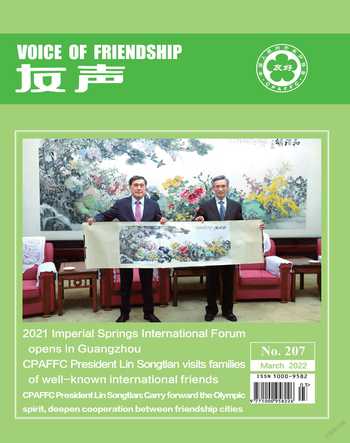Beautiful countryside of China,the home of my life
M y name is Brian Dale Linden, founder of the Linden Center, a country hotel in Yunnan province. In 2021, I won a prize in the global short video contest China in My Eyes: Beautiful Countryside initiated by the Chinese People’s Association for Friendship with Foreign Countries. I felt very honored and proud about it. I’m very glad to present to the readers of Voice of Friendship Xizhou and Shaxi, the two beautiful ancient towns in Dali, Yunnan province.
In the 1980s, I came to China for study and work. At that time, I loved to travel and often took green trains and buses during my holidays to explore different places in China. I was deeply impressed by the beautiful scenery and honest people along the way.
After returning to the United States, I found that China was like my second home, and it was strongly drawing me back. Then in 2004, I came back to China with the idea of building a center for cultural exchanges to let more foreigners know the real and colorful China.
My wife and I spent two years traveling across China to find a place to settle. We finally chose Xizhou in Dali, Yunnan province. There is the beautiful Cangshan Erhai Lake, as well as bright sunshine and good weather. More important, the hospitable villagers of the Bai ethnic group who lived there accepted us without reservation.
With passion and respect for China, we worked with local people to restore a nationally protected heritage compound named after its builder, Yang Pingxiang. The building was the crystallization of local ethnic architectural wisdom. We hope it will continue its vitality in contemporary times. It is also the lifeblood of rural culture.
Developing rural areas is very important in modern society. Big cities around the world are developing rapidly, and many have caught urban diseases and gradually lost their own characteristics. However, the countryside of China is still full of diversity. For example, many villages in Dali have preserved their traditional architecture. In Xizhou, hundreds of old buildings from the Qing Dynasty and the Republic of China period have been kept well, along with skills in crafts such as jiama (a kind of traditional woodblock printing), tie-dye and traditional rituals like Raosanling(a representative festival of Bai ethnic group). These are great cultural treasures the ancestors have left for later generations. Coming to Dali, people will slow down, experience the relationship between man and nature and think about a new way of life.
In Xizhou, there are vast paddy fields, sowing in spring, growing in summer, harvesting in autumn and storing in winter. We have restored the rice transplanting festival and harvest festival in Xizhou, led tourists from other places up the mountain to experience the worship ceremony and learned the Bai dialect with local people. We also teach English to local villagers, hold garden parties and invite them to spend Christmas with us. In this kind of reciprocal interaction, everyone lives in harmony like a family. So instead of calling the center a hotel, it would be more precise to say that I have set up a place for Chinese and Western cultural exchanges. Residents of the local community and guests from all over the world interact and collide with each other in this place.
I am deeply amazed by and proud of the 5,000 years of traditional Chinese culture. It is my sincere wish to let more foreign friends understand Chinese culture, the Chinese land and Chinese people. Once again, I would like to thank the organizer for giving me the honor to show the beautiful countryside of China in my eyes, the home of my life.
- Voice Of Friendship的其它文章
- CPAFFC Vice-President Jiang Jiang delivers a video speech for the exchange activity between Heilongjiang province and its international friendship cities
- Fred Engst:Memories of my father and mother
- Strengthen cooperation and exchanges for mutual benefit and win-win achievement
- “Protecting Our Common Home”Chinese, New Zealand teenagers watch birds in Poyang Lake on internet
- Valuable exchanges between Xi’an and foreign sister cities in pandemic
- Winning speeches of the 39th Chinese Speech Contest of All Japan

